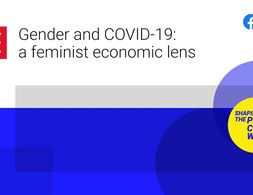12 results
The dossier explores the nature of care work and the gendered constructions and dichotomies that are associated with it. Drawing from feminist analysis the double burden, the undervaluation of feminised labour, the commodification of affective labour and the remittance economy are inquired into. Moreover, it is discussed how welfare regimes rely on the different organization of care work.
This essay suggests to bring together two aspects of economic thought which so far have developed largely separately: degrowth and feminist economics. In this strive, the concept of care work and its role in feminist economics will be introduced and the downsides of the commodification of care work will be discussed. Subsequently, contributions to the discussion on the (re)valuation of care work will be taken into account.
Representing everyone An Analysis of the Representation of Migrant Women by official Labour Organizations in Germany Author Tess Herrmann Review Deborah Sielert This is an essay of the writing workshop Gender and the Economy Perspektives of Feminist Economics published on 17 May 2017 updated on 16 August 2017 Why we …
This essay draws on several analyses on the gender impact of the recession and of austerity policies, in which authors acknowledge a threat to women’s labour market integration and a potential backlash to traditional gender labour structures. We contribute to that literature by asking whether recession and austerity convey a gender effect on educational attainment. Our aim in this essay is to portray the likely effects of austerity measures on gender equality with a focus on women’s participation in tertiary education and to hypothesize the implications of these scenarios for labour market effects, to be tested in future empirical research.
This article reviews insights of existing literature on global care chains. A specific focus is laid on the impact that the refugee crisis has on global care chains and in turn how the crisis impacts the de-skilling of the women in the migrant workforce.
Multimedia dossier on unpaid labor (featuring the UK statistics office unpaid work calculator), migrant care labor and feminist political economy more generally.
Présentation générale des enjeux et objets d'étude d'une approche féministe de l'économie.
La prostitution est-elle la pire des violences patriarcales exercée sur le corps des femmes, ou un travail pas pire qu'un autre ? Pour protéger les femmes, faut-il l’abolir ou donner plus de droits à celles qui l'exercent ? Ces deux positions antagonistes divisent profondément le mouvement féministe.
Entretien avec Sylvie Morel, économiste et professeure titulaire au Département des relations industrielles de l’université Laval, à Québec, où elle est arrivée en 1996. Ses enseignements et ses recherches portent sur les politiques publiques de l’emploi, la sécurité sociale et la théorie économique (l’économie institutionnaliste de John R. Commons et l’économie féministe). Ses travaux sont menés dans une perspective de genre. Elle a collaboré à plusieurs réseaux de recherche féministes, aux fins, notamment, de l’élaboration de formations sur les théories économiques pour les groupes de femmes. Elle est membre du Réseau québécois en études féministes (RéQEF) ainsi que chercheuse associée à la Chaire Claire-Bonenfant – Femmes, Savoirs et Sociétés. Signataire du Manifeste pour un Québec solidaire (2005), elle a co-fondé le site Économie autrement – dédié à la promotion de l’économie hétérodoxe – et y a collaboré pendant 7 ans. Elle a aussi siégé quatre ans au Comité de direction du Centre d’étude sur la pauvreté et l’exclusion (CEPE), rattaché au ministère de l’Emploi et de la Solidarité sociale (MESS).
Cet article rassemble les principaux résultats des études de genre en finance. À partir d’une présentation des résultats inédits d’une enquête sur les ménages français (enquête Pater), nous examinons d’abord les différences de préférences et de comportements entre hommes et femmes en matière financière, puis leurs incidences à plusieurs niveaux.
Nancy Fraser et Elsa Dorlin, philosophes et militantes des Gender Studies, échangent et débattent autour de "Un féminisme pour les 99%. Un manifeste".
This lecture takes a look at the consequences of COVID 19 from a feminist economics perspective Professor Kabeer analyses a range of different impacts associated with COVID 19 and explores the kinds of policies that such a feminist economics lens would suggest for a more resilient and equitable future Naila …
Nous utilisons des cookies sur notre site Web. Cliquez sur Accepter pour nous aider à améliorer constamment Exploring Economics !











